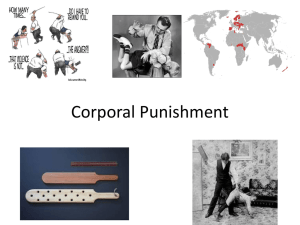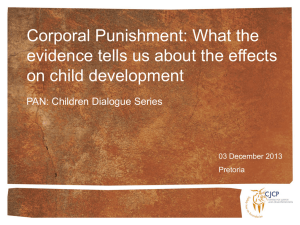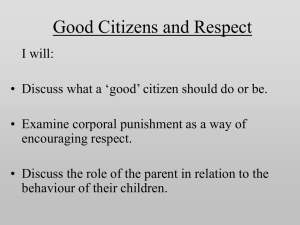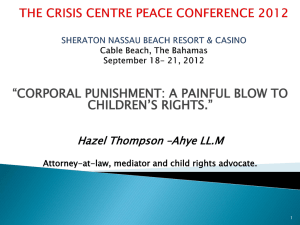This briefing describes the legality of corporal punishment of
advertisement
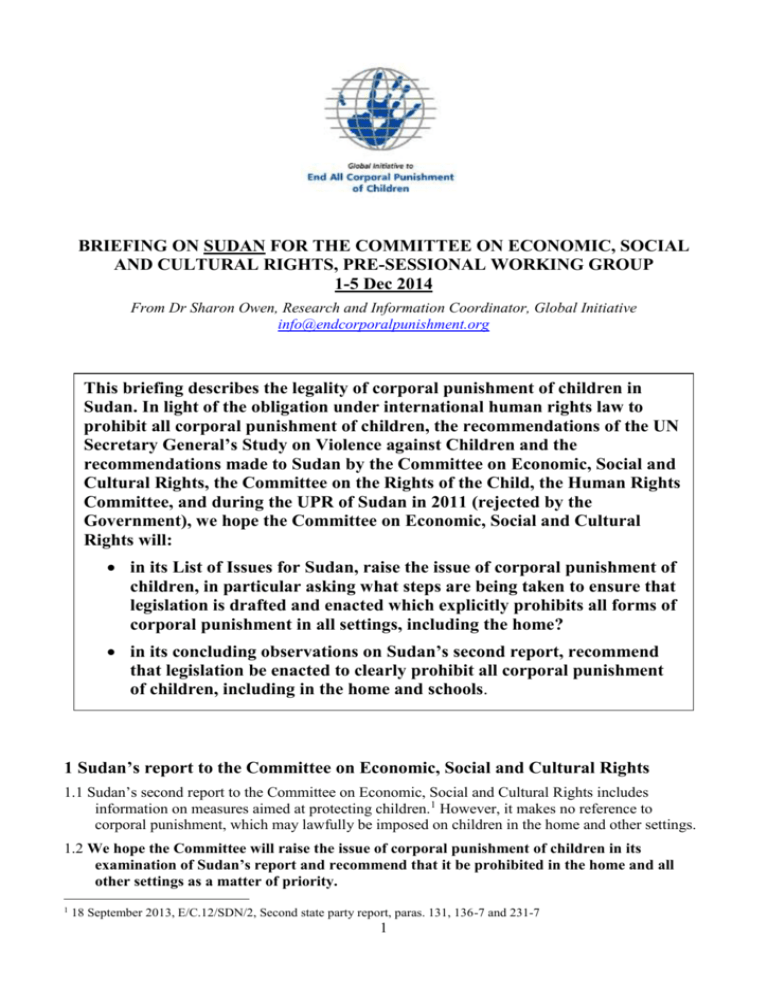
BRIEFING ON SUDAN FOR THE COMMITTEE ON ECONOMIC, SOCIAL AND CULTURAL RIGHTS, PRE-SESSIONAL WORKING GROUP 1-5 Dec 2014 From Dr Sharon Owen, Research and Information Coordinator, Global Initiative info@endcorporalpunishment.org This briefing describes the legality of corporal punishment of children in Sudan. In light of the obligation under international human rights law to prohibit all corporal punishment of children, the recommendations of the UN Secretary General’s Study on Violence against Children and the recommendations made to Sudan by the Committee on Economic, Social and Cultural Rights, the Committee on the Rights of the Child, the Human Rights Committee, and during the UPR of Sudan in 2011 (rejected by the Government), we hope the Committee on Economic, Social and Cultural Rights will: in its List of Issues for Sudan, raise the issue of corporal punishment of children, in particular asking what steps are being taken to ensure that legislation is drafted and enacted which explicitly prohibits all forms of corporal punishment in all settings, including the home? in its concluding observations on Sudan’s second report, recommend that legislation be enacted to clearly prohibit all corporal punishment of children, including in the home and schools. 1 Sudan’s report to the Committee on Economic, Social and Cultural Rights 1.1 Sudan’s second report to the Committee on Economic, Social and Cultural Rights includes information on measures aimed at protecting children.1 However, it makes no reference to corporal punishment, which may lawfully be imposed on children in the home and other settings. 1.2 We hope the Committee will raise the issue of corporal punishment of children in its examination of Sudan’s report and recommend that it be prohibited in the home and all other settings as a matter of priority. 1 18 September 2013, E/C.12/SDN/2, Second state party report, paras. 131, 136-7 and 231-7 1 2 The legality of corporal punishment of children in Sudan 2.1 Summary: In Sudan, corporal punishment of children is not fully prohibited in any setting: it may lawfully be imposed in the home, alternative care settings, day care, schools and in the penal system. 2.2 Home (lawful): Provisions against violence, inhuman and degrading treatment and abuse in the Child Act 2010, the Interim National Constitution of the Republic of the Sudan 2005 and other laws are not interpreted as prohibiting all corporal punishment in childrearing. In 2012, Rules under the Child Act were being drafted: we have no further information. All states have adopted constitutions that provide for child protection but these do not explicitly prohibit all forms of corporal punishment. 2.3 Alternative care settings (lawful): There is no explicit prohibition of corporal punishment: it is lawful as for parents. 2.4 Day care (lawful): Corporal punishment is lawful as in the home. 2.5 Schools (partially prohibited): At federal level, the Child Act prohibits “cruel penalties” in school (art. 29) but does not explicitly prohibit all corporal punishment. Corporal punishment is explicitly prohibited in schools in Khartoum State under Decree No. 10 (2010). 2.6 Penal system – penal institutions (lawful): The Criminal Procedure Act 1991 states that an arrested person “shall be treated in such a way, as may preserve the dignity of the human being” and shall not be hurt physically or mentally (art. 83), but there is no explicit prohibition of corporal punishment in this or the Child Act 2010. 2.7 Penal system – sentence for crime (lawful): The effect of the Child Act 2010 on the legality of corporal punishment as a sentence for crime is unclear. In sentencing a child the court must “give due regard” to the principle that “the sentence of whipping is not inflicted on the child” (art. 77), but it is not clear that giving “due regard” amounts to prohibition of judicial whipping in all cases, including as hudud. The Act does not prohibit other forms of corporal punishment, such as amputation and wounding as retribution, which may be imposed for hudud offences under the Criminal Code 1991 (e.g. see arts. 28, 29, 30, 31, 32 and 168). The Child Act 2010 states that it prevails over any other law where there is inconsistency (art. 3), but it is not clear that this applies to hudud offences. In 2014, Human Rights Watch reported that girls and women continue to be subjected to judicial flogging and other humiliating punishments.2 2.8 In reporting to the Human Rights Committee in 2014, the Government defended the legality of judicial corporal punishment, including flogging and amputation, stating that these punishments “stem from the national belief and creed” and are “imposed in accordance with the law for legitimate public and private interests and safeguarded by all the means of due process of law”.3 3 Recommendations by human rights treaty bodies and during the UPR 3.1 CESCR: In 2000, expressed concern at flogging of women under the Public Order Act 1996 and recommended its abolition.4 3.2 CRC: The Committee on the Rights of the Child has been recommending to Sudan that corporal punishment (flogging) be prohibited since 1993.5 Since 2002, the Committee has recommended 2 Human Rights Watch (2014), World Report 2014, NY: HRW 12 May 2014, CCPR/C/SDN/Q/4/Add.1, Reply to list of issues, para. 16 4 1 September 2000, E/C.12/1/Add.48, Concluding observations on initial report, paras. 24 and 34 5 18 February 1993, CRC/C/15/Add.6, Preliminary observations on initial report, para.7; 18 October 1993, CRC/C/15/Add.10, Concluding observations on initial report, paras. 4 and 17 3 2 prohibition of corporal punishment of children in all settings, including the home – in its concluding observations on the second report in 20026 and on the third/fourth report in 2010.7 3.3 HRC: The Human Rights Committee has three times recommended abolition of cruel punishments such as amputation and flogging – in concluding observations on the second state party report in 1997,8 on the third report in 20079 and on the fourth report in 2014.10 3.4 UPR: Sudan was examined in the first cycle of the Universal Periodic Review in 2011 The Government rejected recommendations to abolish corporal punishment.11 Briefing prepared by the Global Initiative to End All Corporal Punishment of Children www.endcorporalpunishment.org; info@endcorporalpunishment.org September 2014 6 9 October 2002, CRC/C/15/Add.190, Concluding observations on second report, paras. 35, 36 and 70 22 October 2010, CRC/C/SDN/CO/3-4, Concluding observations on third/fourth report, paras. 39 and 40 8 19 November 1997, CCPR/C/79/Add.85, Concluding observations on second report, para. 9 9 29 August 2007, CCPR/C/SDN/CO/3, Concluding observations on third report, para. 10 10 ([July 2014], CCPR/C/SDN/CO/4, Concluding observations on fourth report, para. 16 11 11 July 2011, A/HRC/18/16, Report of the working group, paras. 83(102) and 83(110); 16 September 2011, A/HRC/18/16/Add.1, Report of the working group: Addendum, paras. 23 and 24 7 3


